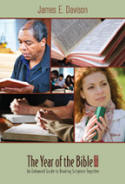Ecclesiastes 6-12; Song of Solomon 1-6; Psalms 95-98; I Timothy 1-5
Hello. I’m back from two+ weeks of visiting with family and vacationing. It’s always good to go away, and always good to get back. Over these last three weeks, I hope your reading has been progressing well. If the summer doldrums have hit you, now’s the time to catch up! In fact, if that’s the case, the readings in the Old Testament for this current week may be just the ticket to get your blood circulating again. We will continue reading to the end of Ecclesiastes, followed by reading the Song of Solomon. It’s a humorous juxtaposition of texts, although humor may not be the right word, given how serious the topics are.
The Song of Solomon is made up of a series of love poems. They are beautifully done, and they evoke the feelings that go with love in youth, when all of life can be lived with so much vigor and vitality. Read these chapters with joy and thanks for the beauty and riches that God has built into this creation – not only in intimate relationships, but in the wonders of nature as well. Notice how the woman expresses her love and joy in 1:16-17: “Our couch is green; the beams of our house are cedar. Our rafters are pine.” In other words, the eyes of love allow you to see beauty everywhere in life.
But, of course, just before you get to the Song of Solomon, you will be reading Ecclesiastes. Chapter 12 begins, “Remember your creator in the days of your youth” – that is, in the time that the Song of Solomon relishes. But then we get the kick in the teeth: “before the days of trouble come, and the years draw near when you will say, “’I have no pleasure in them.’” Throughout the book, Ecclesiastes keeps reminding us that “all is vanity.” No matter what we have here on earth, life is going to end. We can’t even be sure we’ll live a normal life-span, as he writes in 9:12: “Like a fish taken in a cruel net, and like birds caught in a snare, so mortals are snared at a time of calamity, when it suddenly falls upon them.”
But back to chapter 12. Verses 2-8 give a lengthy description of what it is like when “the days of trouble come” and there is “no pleasure in them.” There are a number of interpretations of this section, but a popular one suggests that Ecclesiastes is writing about the struggles of old age as he observed them. So then, some of the images could be:
- Guards of the house that tremble = arms and hands
- Strong men that are bent = bones, especially of the back
- Women who grind are weak = teeth
- Those looking out of the house = eyes
- Doors on street that are shut = ears
There are different interpretations of these images, but you get the idea. The picture continues with a number of images that suggest the fears that can afflict the frail in old age – sudden noises, danger of falling, etc., and it ends with images of death, when “the dust returns to the earth.”
All of this should make us very humble. And it should remind us that our only hope is in God’s continuing love in Jesus Christ. The New Testament readings in I Timothy talk about that this week too, but we would be wise not to jump too glibly to those more positive passages. Too often, our so-called “health and wealth gospel” preachers make it sound like life will go easily if we just believe in Jesus. Their sermons would undoubtedly be a good deal more beneficial if they paid more attention to Ecclesiastes.


Leave a comment